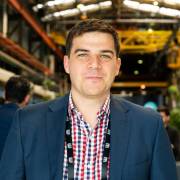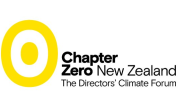Disrupting the status quo for a sustainable future

For Oliver Bruce MInstD, climate change isn’t just a challenge – it’s the ultimate game theory problem. Everyone pollutes, but the effects are felt in places completely unconnected to those that caused the problem. It explains why governments everywhere are struggling to reduce emissions meaningfully.
The answer, he says, is to build a better solution than the one causing the problem.

Oliver Bruce
As a climatetech investor with a background at Uber and Blackbird Ventures, Bruce has spent his career identifying and backing companies that challenge conventional thinking and drive meaningful change.
Today, he believes New Zealand has a unique opportunity to lead in the global fight against climate change by developing and exporting cutting-edge climatetech solutions.
“New Zealand is a minnow in terms of global emissions, but that doesn’t absolve us from acting. We have a moral obligation to our kids and to the world. Lots of countries look to us, and we need to be smart about how we act.”
Being smart means recognising that electrifying the economy isn’t just about reducing emissions, it is also sound business.
“When you can save money and reduce emissions, that’s a no-brainer. Initiatives such as Rewiring Aotearoa are showing us the way forward by promoting large-scale programmes for solar and community electrification,” he says.
“Solar and batteries are a classic example of climatetech that has just continued to get cheaper and cheaper, to the point now that the average Kiwi household will save more than $2,000 every year by putting solar on their roof and shifting to electrical appliances and cars. The savings will only grow more every year.”
But the vision extends beyond New Zealand’s borders. Bruce is convinced the greatest leverage lies in developing technologies that can be scaled globally to make a significant impact. “If we really want to make a difference, we need to focus on leverage.
“The biggest opportunity for impact, and the one that will make us richer as a country, is getting good at developing and exporting climatetech technologies that reduce emissions worldwide. This is how we can have a real impact.”
Bruce points to companies such as CarbonScape, where he serves on the holdings company board, as an example of what is possible. “CarbonScape is leading the way in producing biographite for lithium-ion battery anodes using renewable timber byproducts. The technology is not just innovative, it’s cost-effective, geography-agnostic and carbon-negative.
“In a world looking to reduce embodied emissions and transition away from concentrated and fickle supply chains, there is demand for millions of tonnes of this product.
“At scale, this one company has the possibility to mitigate the equivalent of double-digit percentages of New Zealand’s entire gross emissions. And that’s just one company. There are many such companies, and they will likely make us a lot of money. We should be doing everything we can to support them.”
“The future won’t be won by offsetting – it’s like buying penance,” he says. “It will be won by driving down the cost of energy and developing solutions that are both greener and cheaper.”
New Zealand’s climatetech sector is already home to several companies that embody this leveraged approach. One company leading the way is LanzaTech, a sustainable fuels company that originated in New Zealand and is now listed on the Nasdaq.
“LanzaTech is now a world leader in turning waste carbon into sustainable aviation fuel, which is 3-4 per cent of global emissions,” says Bruce. “The opportunity in front of it is massive.”
Other companies, such as Invercargill-based EnPot, are changing the way energy is used in industrial processes. “EnPot is transforming how smelters use energy to produce aluminum, letting them ramp power up/down by 30 per cent at very short notice,” he says.
“This is exactly the kind of disruptive technology that can help countries around the world flood their grids with renewables and retire coal plants. They’re screaming out for solutions.”
Vessev, another standout, is developing hydrofoiling electric ferries with the help of America’s Cup engineers. They are redefining what is possible in marine transport, offering a cleaner, more efficient alternative that could revolutionise the industry.
“They emerged into public and got $50 million of orders in a very short time – again, everyone is looking for solutions to these hard challenges,” says Bruce.
As a director, his focus is on finding companies with the potential to disrupt the status quo. His experience at Uber, a company that transformed the transportation industry, and his role as an investor at Blackbird Ventures have given him a unique perspective on what it takes to drive change.
“I’m looking for companies and opportunities that, if they work, will fundamentally alter the market dynamics. Climatetech is ripe for this kind of disruption. We have the biggest industrial transition we’ve ever needed to make, and we need to make it in rapid time.”
Even in the face of daunting challenges such as sea level rise and increasing weather variability, his optimism about the future is evident. “I’m super worried about these issues, but I prefer to focus on the opportunities. The future is going to be amazing if we can leverage our strengths and drive innovation in the right areas.”
Bruce’s involvement with CarbonScape and other innovative companies underscores his commitment to finding and fostering technologies that have the potential to make a global impact.
“The future won’t be won by offsetting – it’s like buying penance,” he says. “It will be won by driving down the cost of energy and developing solutions that are both greener and cheaper.”
For Bruce, the path forward is clear. “New Zealand has the talent and the ingenuity to lead in climatetech innovation. We have a moral imperative to act, but more than that, we have a strategic opportunity to make a real difference – for our economy and for the planet.”
Climate Governance Forum
Oliver Bruce will join the IoD’s panel of speakers at the inaugural Climate Governance Forum in Auckland on 21 October. Leaders in climate governance and subject matter experts will explore the board’s role in governing climate change, looking at how to leverage opportunities and manage the physical and transition risks of climate change.
This will include balancing the various tensions such as short-term viability, long-term sustainability, maintaining social licence and changing stakeholder demands around the board table. Other topics will include climate reporting, regulation, stakeholder expectations, trade restrictions – and more.
Visit climate-governance-forum to book tickets, and for more information on the speakers and programme.
